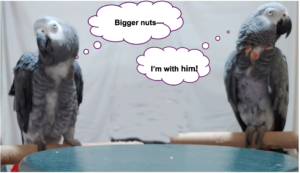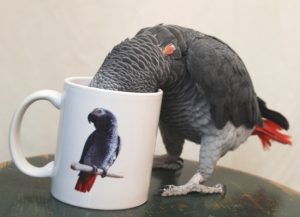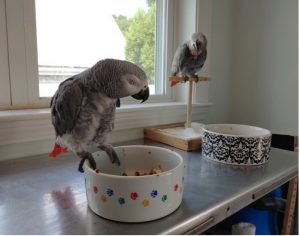 Most of the time, our parrots find the tasks we present to them interesting, if challenging, and they really seem to enjoy doing the various trials. They carefully watch us set up the equipment; Griffin will often start asking for a reward (“Wanna nut!”), both to signal us to hurry up and about his readiness to participate.
Most of the time, our parrots find the tasks we present to them interesting, if challenging, and they really seem to enjoy doing the various trials. They carefully watch us set up the equipment; Griffin will often start asking for a reward (“Wanna nut!”), both to signal us to hurry up and about his readiness to participate.
Despite his request, they mostly get other types of rewards instead of nuts—the chance to interact with the object that they’ve just identified (e.g., to chew on the wood or paper they have correctly labeled), vocal comments (we tell them “Good job!”), and responses to their specific requests (“TICKLE!”)—although nuts are standard for some of the types of choice tasks I describe below. I’ve written previously about times when none of these rewards were enough to get them to continue a task, and, of course, sometimes they just won’t cooperate at all! Lately, they’ve come up with new tactics. But first some background.
Alex—Master Manipulator
 Alex was a master of noncompliance. If he didn’t want to work during a given session, he would avert his gaze from the tray that held the equipment for the task, would avoid making eye contact with the tester, and instead would endlessly preen, request to be returned to his cage (“Wanna go back!) or demand treats (“Want corn!”, “Want cork!”) that he’d then immediately discard. Sometimes he would utter strings of irrelevant labels (e.g., ones unrelated to the task at hand). Whenever he acted thusly (Pepperberg, 1992; Pepperberg & Gordon, 2005; Pepperberg & Lynn, 2000), we ended the session.
Alex was a master of noncompliance. If he didn’t want to work during a given session, he would avert his gaze from the tray that held the equipment for the task, would avoid making eye contact with the tester, and instead would endlessly preen, request to be returned to his cage (“Wanna go back!) or demand treats (“Want corn!”, “Want cork!”) that he’d then immediately discard. Sometimes he would utter strings of irrelevant labels (e.g., ones unrelated to the task at hand). Whenever he acted thusly (Pepperberg, 1992; Pepperberg & Gordon, 2005; Pepperberg & Lynn, 2000), we ended the session.
In the worst case, he would respond with all the possible wrong answers to a given question and then repeat them (sometimes for a total of 12 times); statistically, that is impossible unless he knew the correct answer and was carefully avoiding it (Pepperberg & Lynn, 2000)! Usually that happened when we were at the end of an experiment and he had already done a large number of trials—and was obviously bored. Sometimes it seemed as though he were trying to tell us that he thought that we were incredibly stupid. As far as he was concerned, he had already TOLD us the answer many times, and yet we still kept asking the same dumb questions!
Nevertheless, even though repeatedly questioning the birds on the same topic can be boring, we have to engage in such repetition to achieve statistical significance: One correct answer could just be luck, but 18/20 correct answers mean that the subject really understands how to solve the problem. Interestingly, Griffin seems to have learned some of this undesirable conduct from Alex. He, too, sometimes exhibits the same types of noncompliance behavior patterns (Pepperberg & Nakayama, 2016), all of which can be extremely frustrating.
Griffin & Athena Strike For Bigger Rewards

Recently, Griffin and Athena have come up with another way to demonstrate that they simply do not want to work in a given situation—throwing their rewards in our faces! Then they literally went on “strike”—it seemed in order to demand larger pieces of nut.
What happened was the following. We had been doing a series of different tasks in which both birds have to choose their answer by tapping on an object. In a few tasks, they must find and then extract the reward; we thus have to use something like half a cashew as the target so that it can easily be tracked. That amount of nut is a windfall; most of the time, the tasks involve giving them two or three choices, and if they act appropriately (e.g., they correctly respond to “Choose X” rather than Y or Z), they receive a sixteenth or at most an eighth of a nut.
After scoring just a bit above chance for several weeks on the latter type of studies (not great, but an indication that they were learning the tasks), they both began sessions by doing a single trial, taking and tossing their reward in our faces, and then preening and ignoring us. Or they would score 0/10. As I noted above, that type of score implies they know the appropriate response and deliberately choose to avoid the correct answer!
Needless to say, their behavior made data collection very difficult, and we usually ended the session and tried another task. My RAs kept thinking that the birds’ behavior was a consequence of a problem with the protocol, and spent a lot of time thinking up ways to change how we presented the tasks. But, looking at the situation from the birds’ point of view, I had another idea. I tried doubling the size of the reward—to roughly a quarter of a cashew.
I was pretty annoyed, but—unlike my RAs—not the least surprised, when Griffin scored 100% and Athena 80% on the very next set of trials. Had they really worked together to force us to cede to their demands? Of course, one never knows what actually is going on in their birdie brains, but it sure seemed as though that was the case. And, of course, to keep from overloading them with nuts, we can now do only half as many trials per session. Interestingly, they don’t seem to like having sessions cut short, and now sometimes balk at leaving the training perch. It will be interesting to see what happens next!
References
Pepperberg, I. M. (1992). Proficient performance of a conjunctive, recursive task by an African Grey parrot (Psittacus erithacus). Journal of Comparative Psychology, 106, 295–305.
Pepperberg, I. M., & Gordon, J. D. (2005). Number comprehension by a Grey parrot (Psittacus erithacus), including a zero-like concept. Journal of Comparative Psychology, 119, 197–209.
Pepperberg, I. M., & Lynn, S. K. (2000). Perceptual consciousness in Grey parrots. American Zoologist, 40, 393–401.
Pepperberg, I. M., & Nakayama, K. (2016). Robust representation of shape in a Grey parrot (Psittacus erithacus). Cognition, 153(21), 146–160.
